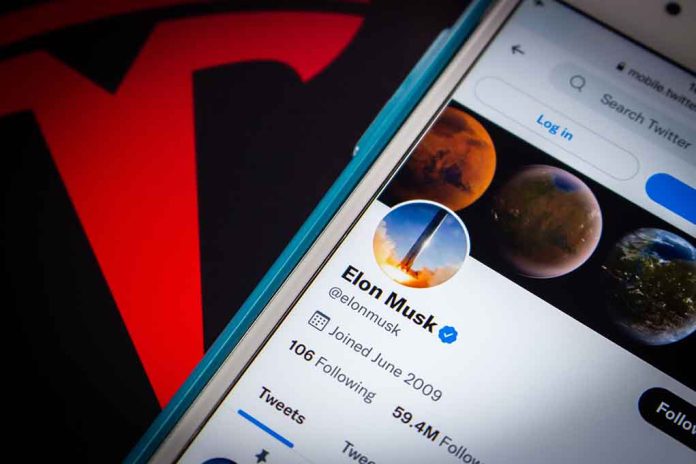
Elon Musk’s controversial TV commercials spark debate on wealth inequality and political influence.
At a Glance
- Elon Musk’s wealth exceeding $200 billion highlights extreme economic disparity in the U.S.
- The wealthiest 1% now own over 35% of the nation’s household wealth, up from 20% in the 1970s
- Political ad spending for the current election cycle is expected to surpass $10 billion
- Concentrated wealth poses risks to democracy by consolidating power among a few individuals
- Future elections may see more precise ad targeting, potentially increasing political polarization
The Second Gilded Age: Wealth Concentration and Its Implications
The United States is experiencing a second Gilded Age, characterized by unprecedented wealth concentration among a small number of individuals. Elon Musk, with his fortune surpassing $200 billion, exemplifies this extreme economic disparity. During the pandemic, U.S. billionaires increased their wealth by a staggering $2.1 trillion, further widening the gap between the ultra-rich and the average American.
The wealth inequality in America has reached alarming levels, with the richest 1% now owning over 35% of the nation’s household wealth, a significant increase from 20% in the 1970s. This concentration of wealth is more pronounced than income inequality, as wealth tends to compound over time, creating a self-perpetuating cycle of economic power.
The Impact of Concentrated Wealth on Democracy
The consolidation of wealth among a small group of individuals poses significant risks to democratic principles. With half of the stock market owned by the wealthiest 1%, their influence extends far beyond economic realms. This concentration of economic power translates into political clout, allowing the ultra-wealthy to shape policies and legislation in their favor.
The largest intergenerational transfer of wealth in history is currently underway, with an estimated $30 to $70 trillion expected to be passed down. This dynastic wealth undermines the meritocratic ideals of America and exacerbates existing gender and racial wealth disparities. For instance, the typical single woman and Black household own significantly less wealth compared to their male and white counterparts.
Political Advertising and Its Role in Shaping Public Opinion
The upcoming election cycle is set to witness an unprecedented surge in political advertising, with over $10 billion expected to be spent. This marks a 20-25% increase from the 2020 election cycle. Key battleground states like Pennsylvania are at the epicenter of this advertising frenzy, with nearly $1 billion in ad spending anticipated, including $450 million for the presidential race alone.
The stark contrast between U.S. election advertising practices and those of other democracies, such as the UK, is noteworthy. While the U.S. sees a prolonged period of intense political advertising, the UK maintains strict spending caps and bans political ads on radio and TV. This unrestricted approach in the U.S. raises questions about the influence of wealth on political outcomes.
The Evolution of Political Advertising Strategies
As the political landscape evolves, so do advertising strategies. Recent campaign ads have shifted focus to the economy, recognizing it as a key issue for both parties. The Harris campaign has significantly out-fundraised and outspent Trump’s, with a notable advantage in social media advertising on platforms like Facebook and Instagram. Conversely, Trump’s campaign relies heavily on free media coverage and support from wealthy backers focusing on voter turnout.
The targeting of political ads has become increasingly sophisticated. Harris’s ads primarily target younger audiences and women, while Trump’s focus on traditional TV reaches older voters. This precision in ad targeting is expected to increase in future elections, potentially exacerbating political polarization and creating tension in diverse social settings.
Looking Ahead: The Future of Wealth Inequality and Political Influence
As we move forward, addressing wealth inequality and its impact on political processes remains a critical challenge. The concentration of wealth and power among a select few, exemplified by figures like Elon Musk, continues to shape public discourse and policy decisions. The upcoming election cycle will likely serve as a litmus test for the effectiveness of big-budget political advertising and its influence on voter behavior.
To tackle these issues, America may need to draw inspiration from its past. During the First Gilded Age, President Teddy Roosevelt implemented measures to address wealth inequality. Similar bold actions may be necessary to ensure a more equitable distribution of wealth and maintain the integrity of democratic processes in the face of unprecedented economic concentration.
Sources:
- https://www.washingtonpost.com/technology/2024/10/07/musk-trump-x-ads/
- https://www.wsj.com/articles/elon-musks-x-courts-political-advertisers-ahead-of-a-contentious-election-year-66dc90a5
- https://robertreich.org/post/666874177346797568
- https://www.bbc.com/news/articles/c4gl013w4e8o
- https://www.cnbc.com/2019/12/31/what-billionaires-said-about-wealth-inequality-and-capitalism-in-2019.html
- https://www.nytimes.com/2022/05/23/opinion/elon-musk-jeff-bezos-social-media.html
- https://www.wsj.com/tech/elon-musk-politics-trump-social-media-267d34c8
- https://www.modernghana.com/news/1347377/the-dark-side-of-maga-elon-musks-endorsement.html
- https://www.rollingstone.com/culture/culture-features/elon-musk-twitter-misinformation-timeline-1235076786/
- https://today.usc.edu/political-advertising-in-the-2024-election-qa-with-uscs-steve-caplan/










